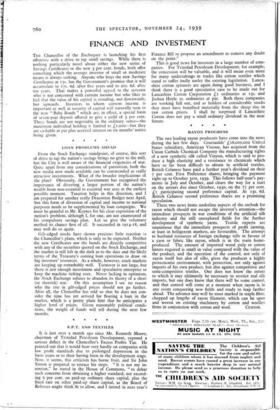E.P.T. AND TEXTILES
It is just over a month ago since Mr. Kenneth Moore, chairman of Trinidad Petroleum Development, exposed a serious defect in the Chancellor's Excess Profits Tax. He pointed out that it would bear very hardly on companies with low profit standards due to prolonged depression in the basis years or to their having been in the development stage. Now, it seems, this criticism has borne fruit, and Sir John Simon is prepared to retrace his steps. " It is not my in- tention," he stated in the House of Commons, " to debar such concerns from obtaining a higher standard, not exceed- ing 6 per cent. on paid-up ordinary share capital, plus the fixed rate on other paid-up share capital, as the Board of Referees might think fit to allow, and I intend in next year's Finance Bill to propose an amendment to remove any doubt on the point." This is good news for investors in a large number of com- panies. For Trinidad Petroleum Development, for example, the concession will be valuable, and it will mean even more for many undertakings in trades like cotton textiles which stand to suffer badly under the existing legislation. Lanca- shire cotton spinners are again doing good business, and I think there is a good speculative case to be made out for Lancashire Cotton Corporation Li ordinaries at 13s. and Joshua Hoyle 2S. ordinaries at par. Both these companies are working full out, and as holders of considerable stocks they must have benefited materially from the sharp rise in raw cotton prices. I shall be surprised if Lancashire Cotton does not pay a small ordinary dividend in the near future.




































 Previous page
Previous page